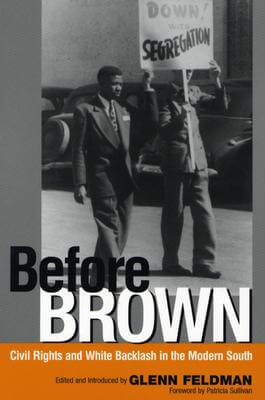Book Review: Before Brown: Civil Rights and White Backlash in the Modern South
by Glenn Feldman and Patricia Sullivan
Publication Date: Sep 13, 2004
List Price: $34.95
Format: Paperback, 448 pages
Classification: Fiction
ISBN13: 9780817351342
Imprint: University Alabama Press
Publisher: University Alabama Pressv
Parent Company: University Alabama
Read a Description of Before Brown: Civil Rights and White Backlash in the Modern South
Book Reviewed by Kam Williams
"Before Brown details the ferment in civil rights that took place across the South before the momentous Brown vs. Board of Education decision in 1954. This collection refutes the notion that the movement began with the Supreme Court decision, and suggests, rather, that the movement originated in the 1930s and earlier, spurred by the Great Depression and, later, World War II.
This work explores the
growth of the movement through its various manifestations-the activities of
politicians, civil rights leaders, religious figures, labor unionists, and
grass-roots activists-throughout the 1940s and 1950s. It discusses the critical
leadership roles played by women and offers a new perspective on the
relationship between the NAACP and the Communist Party."
’Glenn Feldman
Most people assume that the Civil Rights Movement in the South started in the mid-Fifties. But truth be told, African-Americans had been continuously challenging the social order there since the days of Reconstruction. However, every attempt at equality had been met with an absolute, often violent, anti-black backlash on the part of a white majority unwilling to budge an inch in terms of sharing their long-standing advantages.
According to University of Alabama Professor Glenn Feldman, "It is little wonder that so many whites from all walks of life clung to segregation and white supremacy with such tenacity- indeed desperation." For as he points out in the Prologue of Before Brown, "As members of a select caste, whites enjoyed access to better parks, playgrounds, schools, libraries, jobs, restaurants, entertainments, public amenities, health care, housing, neighborhoods and credit."
What was remarkable, however, was the repeated brave attempts on the part of many of those they oppressed to eradicate the clearly-defined ethnic lines of demarcation, knowing that neither the courts nor the cops would protect them from the Ku Klux Klan, lynching and the innumerable other forms of intimidation which would invariably ensue. This fascinating history lesson focuses on the activism in those difficult decades leading up to the period now popularly thought of as being responsible for unilaterally overturning Jim Crow.
Before Brown is actually a series of essays by 11 different experts in the field. For instance, University of Southern Florida Raymond Arsenault examines the case of Irene Morgan, a black mother of two who refused to move to the back of a Greyhound bus in Virginia in 1944, over ten years before Rosa Parks.
Morgan, who had recently suffered a miscarriage, was on her way from her mother’s home in the country to a doctor in the city, when she was dragged off a bus, savagely beaten and arrested for sitting in an empty seat in the WHITE ONLY area, even though the COLORED section was entirely filled. This chapter of the book goes on to illustrate how she was subsequently successfully defended in court by Thurgood Marshall and other NAACP attorneys. Furthermore, by 1947, Morgan’s actions had inspired CORE (The Congress of Racial Equality) to stage organized non-violent civil disobedience aboard public transportation, again, well ahead of the better-known Freedom Riders.
Thus, it is easy to see how Before Brown does an invaluable service by proving that the African-American assertion of dignity has been a seamless story which not only began well before Dr. Martin Luther King but even continues to this very day. For as author Feldman astutely concludes about discrimination, "To an extent that many of us are reluctant to admit, these unfortunate tendencies still persist at, or just under the surface of the present-day South, shaping and coloring the region’s approach to politics, economics, and social mores. [They] appear in softer, sanitized, and more euphemistic forms. Yet appear they still do."

